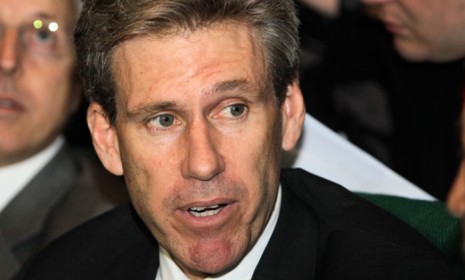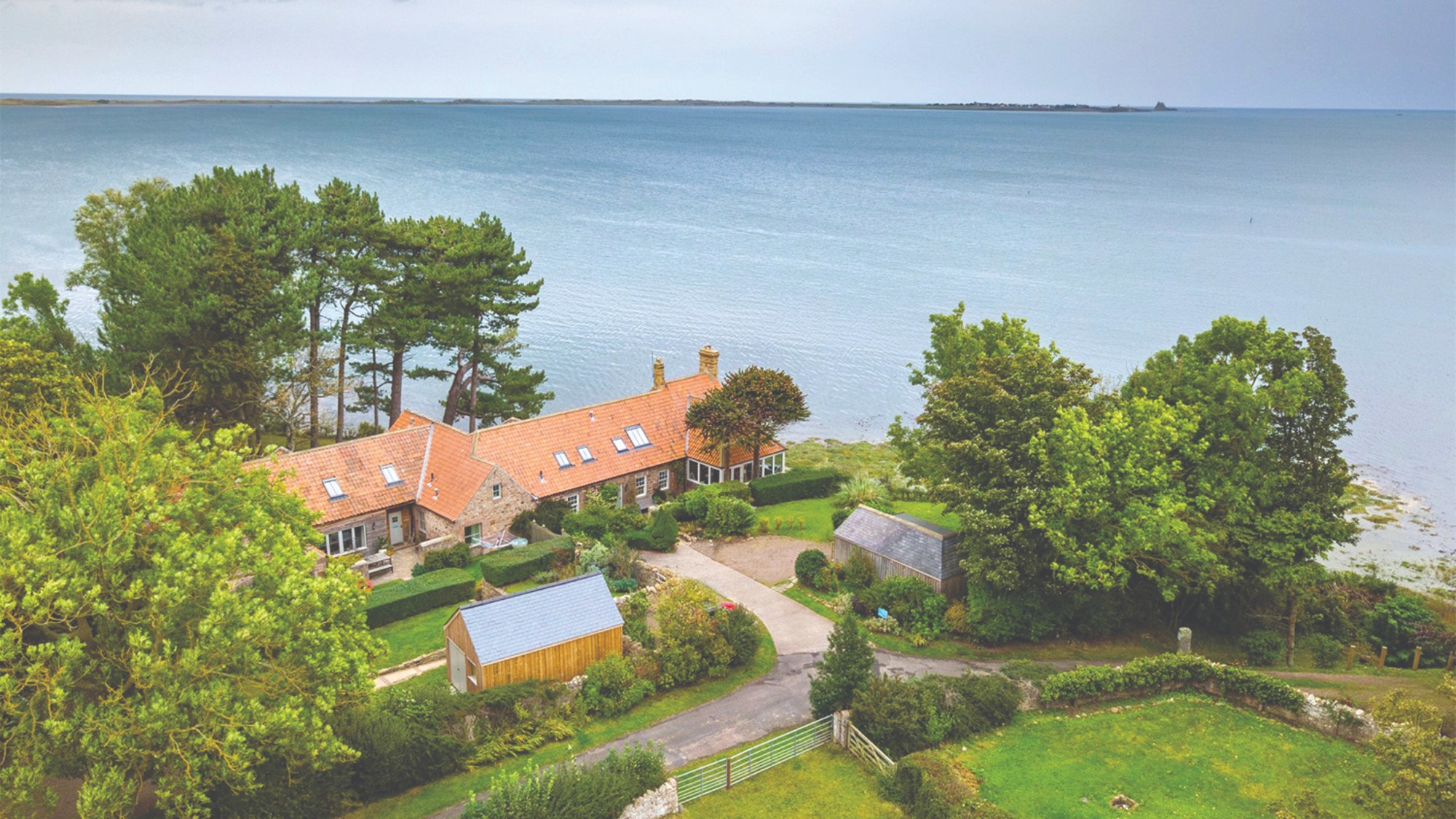The slaying of the U.S. ambassador in Libya: 5 talking points
After attacks by mobs furious over an amateurish anti-Islam video, the Obama administration is shaken by the first killing of the head of a U.S. embassy in decades

A free daily email with the biggest news stories of the day – and the best features from TheWeek.com
You are now subscribed
Your newsletter sign-up was successful
The U.S. ambassador to Libya, Christopher Stevens, was killed late Tuesday when an armed Islamist mob stormed the American Consulate in Benghazi, blaming America for an amateurish film, promoted online by Koran-burning Florida pastor Terry Jones, that insults the Prophet Mohammad. Stevens was the first American ambassador to be murdered on duty in more than two decades, and three other American diplomatic staff members were also killed in Tuesday's violence. President Obama strongly condemned the "outrageous attack," and ordered beefed-up security for U.S. diplomats around the world. Leaders of Libya's government, who rose to power after the U.S. helped depose Moammar Gadhafi, promised to hunt down the killers. Meanwhile, the U.S. embassy in Egypt was also over-run by protesters angered by the anti-Islam film, and the Cairo embassy condemned both the attack and the video that provoked it. The White House later disavowed the Cairo embassy's statement, and Secretary of State Hillary Clinton said there was "no justification" for such "senseless violence," saying it was hard to comprehend how this could happen "in a country we helped liberate." What will the explosion of anti-U.S. violence mean for Libya, Egypt, Washington, and the world? Here, five talking points:
1. A mob killed Stevens — but the filmmaker is hardly innocent
After hearing the shocking news that Ambassador Stevens was dead, says Farah Stockman at The Boston Globe, I sat down to watch the trailer of the YouTube movie, Innocence of Muslims, that enraged the crowd that killed him. The video, made by Sam Bacile, an Israeli-American real estate developer, "felt like a Saturday Night Live spoof," with "terrible acting" and soft-porn-like scenes "depicting the Prophet Mohammad as a sexual deviant and an idiot." To be clear, the "despicable" mob alone is to blame for this senseless killing. "But shouldn't people who knowingly incite violence against the United States — as a crude, thinly-veiled publicity stunt — also be held accountable?"
The Week
Escape your echo chamber. Get the facts behind the news, plus analysis from multiple perspectives.

Sign up for The Week's Free Newsletters
From our morning news briefing to a weekly Good News Newsletter, get the best of The Week delivered directly to your inbox.
From our morning news briefing to a weekly Good News Newsletter, get the best of The Week delivered directly to your inbox.
2. Libya's experiment with democracy is in trouble
Stevens' death makes it impossible to ignore one of the fundamental problems in post-Gadhafi Libya, says Jonathan Marcus at BBC News: "The country is awash with weapons and armed militias" — some of them Salafist Muslim extremists. The Obama administration is going to want answers from the Libyan government about how such a security breach could happen. But the truth is, militia fighters never surrendered their weapons after the war to topple Gadhafi, and these guys now control entire chunks of the country. The fact that they can commit a crime like this, and the government is powerless to stop them, calls into question "the whole trajectory of Libya's democratic project."
3. This might not be the last attack on U.S. diplomats
The U.S. just "entered a new time of testing in the long war against Islamism," says John Podhoretz at Commentary. It's tempting to use this as an occasion to slam "Barack Obama's weakness and vacillation." But let's put behind us the "strange spectacle of the dreadful initial response" — the U.S. embassy's apology for something the U.S. didn't even do, and the White House's prompt disavowal. Chalk that up to the shock of the attack. From here on out, though, Obama has to react with clarity and resolve, "or there will be more of this. Much more."
A free daily email with the biggest news stories of the day – and the best features from TheWeek.com
4. Obama's options are limited
If Gadhafi were still in charge of Libya, says David Blair at Britain's Telegraph, these murders would be "just cause for a military strike." At the very least, Washington would hit Libya with harsh sanctions. But Libya now has a supposedly "friendly, pro-Western elected government, which owes its very existence to U.S. and Western military muscle." That leaves Obama with "little choice but to insist that America leads the investigation into the incident and that everything is done to hunt down those responsible." He should also insist on "free rein for the FBI and the U.S. military" within Libya. But that means Obama would have to "brush aside any concerns about the country's sovereignty."
5. Obama is actually handling this much as Bush would have
Republicans have predictably seized on the "weak initial statement" out of Cairo to "paint Obama as soft-on-Islam," says Adam Serwer at Mother Jones. Many Republicans, you see, live in a fantasy world where the U.S. "conducts diplomacy the way that Sean Hannity used to treat Alan Colmes." The reality, though, is that a Republican administration probably would have reacted no differently than Obama did. Look to the Bush years: When Western free speech was on the line in 2006, during the backlash to European editorial cartoons denigrating Islam's prophet Mohammad, Bush affirmed the right of free expression, but that the cartoons were "offensive, and we certainly understand why Muslims would find these images offensive." Sound familiar?
-
 What to watch out for at the Winter Olympics
What to watch out for at the Winter OlympicsThe Explainer Family dynasties, Ice agents and unlikely heroes are expected at the tournament
-
 Properties of the week: houses near spectacular coastal walks
Properties of the week: houses near spectacular coastal walksThe Week Recommends Featuring homes in Cornwall, Devon and Northumberland
-
 Will Beatrice and Eugenie be dragged into the Epstein scandal?
Will Beatrice and Eugenie be dragged into the Epstein scandal?Talking Point The latest slew of embarrassing emails from Fergie to the notorious sex offender have put her daughters in a deeply uncomfortable position
-
 The billionaires’ wealth tax: a catastrophe for California?
The billionaires’ wealth tax: a catastrophe for California?Talking Point Peter Thiel and Larry Page preparing to change state residency
-
 Bari Weiss’ ‘60 Minutes’ scandal is about more than one report
Bari Weiss’ ‘60 Minutes’ scandal is about more than one reportIN THE SPOTLIGHT By blocking an approved segment on a controversial prison holding US deportees in El Salvador, the editor-in-chief of CBS News has become the main story
-
 Has Zohran Mamdani shown the Democrats how to win again?
Has Zohran Mamdani shown the Democrats how to win again?Today’s Big Question New York City mayoral election touted as victory for left-wing populists but moderate centrist wins elsewhere present more complex path for Democratic Party
-
 Millions turn out for anti-Trump ‘No Kings’ rallies
Millions turn out for anti-Trump ‘No Kings’ ralliesSpeed Read An estimated 7 million people participated, 2 million more than at the first ‘No Kings’ protest in June
-
 Ghislaine Maxwell: angling for a Trump pardon
Ghislaine Maxwell: angling for a Trump pardonTalking Point Convicted sex trafficker's testimony could shed new light on president's links to Jeffrey Epstein
-
 The last words and final moments of 40 presidents
The last words and final moments of 40 presidentsThe Explainer Some are eloquent quotes worthy of the holders of the highest office in the nation, and others... aren't
-
 The JFK files: the truth at last?
The JFK files: the truth at last?In The Spotlight More than 64,000 previously classified documents relating the 1963 assassination of John F. Kennedy have been released by the Trump administration
-
 'Seriously, not literally': how should the world take Donald Trump?
'Seriously, not literally': how should the world take Donald Trump?Today's big question White House rhetoric and reality look likely to become increasingly blurred